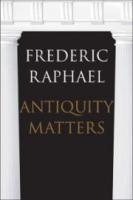
Yale (2017) h/b 362pp £20 (ISBN 9780300215373)
If you are intrigued to discover the connection between the 3rd C BC mathematician Archimedes and the Austrian composer Anton Webern, or fascinated by the existence of a Youtube video of Jonathan Miller’s 1966 black and white BBC TV version of the Phaedo starring Leo McKern as Socrates, then this is the book for you. It is advertised in the introduction as a type of ‘montage’ intended to act as a ‘primer’ offering ‘signposts’ towards ‘intelligence’ and ‘entertainment’ (p. xiii). Intentionally provocative in its conception, it features 79 short chapters on a gallimaufry of classical subjects ranging from the problems with Athenian democracy to the fear of aliens and emigrants; from classical myths and Latin word derivations to Greek attitudes towards animals or failure; from race relations and civil war to lightweight sandals and cricket—arranged in loosely chronological order.
This book offers a light-hearted survey of our classical heritage, packed with anecdotes and narratives of more or less well known stories from the classical world, such as that of Alexander the Great’s slaughter of ‘Black’ Cleitus (‘fratricide replaced fraternity’ p. 268) or of the neo-Platonist senator Rogatianus, who was cured of gout by voluntary poverty leading to beneficial physical exercise (p. 117). It slips easily back and forth between the ancient and modern worlds, tracing the origins of modern practices like Spanish bull-fighting and atheism.
The prose writing is vigorous with many stylish bons mots (‘Those who slay together stay together’ p. 126, ‘creed trumped science and cramped thought’ p. 82, ‘rank stank’ p. 87), laced with paradoxical observations (‘the dread of and desire for progress’ p. 37) and alliterative jingles (e.g. Australia is a ‘penitential paradise’ (p.191), Alcibiades and Catilina are ‘tailored turncoats’ (p. 247) and young brides are ‘marital merchandise’ (p.263). The danger of such wide-ranging and bravura exhibitions of erudition, salted with allusions to and punchlines from well-known tales or famous quotations (like Byron’s ‘butchered to make a Roman holiday’), is the glib purveying of misinformation: not just minor typos, as when a Spartan grandee at Salamis ends up as Euryblades (p. 198), but the more serious misattribution of three interior Corinthian columns to the temple at Bassae, an assertion for which Mary Beard and John Henderson’s Classics: A Very Short Introduction cannot be held responsible (p.74). The book also ends abruptly with Tacitus and Himmler’s interest in the Germania, the hasty conclusion offered being that modern intellectuals misuse and pervert ancient texts to such an extent that the inhabitants of the Mediterranean world ‘would not be at home in what wishful ingenuity or tendentious hindsight chooses to parade as the restored face or translated logos of antiquity’ (p. 339).
This is a book for non-specialist entertainment rather than earnest digestion, which is encouraged by the comprehensive and eclectic index. All Greek is transliterated, and also translated, as is the Latin, and all technical terms are briefly explained. There are also many suggestions in the footnotes for further reading in a variety of languages.
Claire Gruzelier
